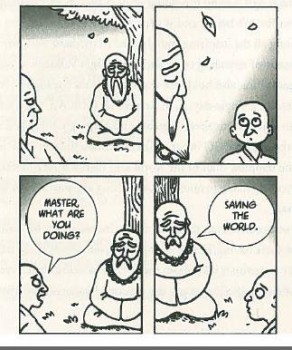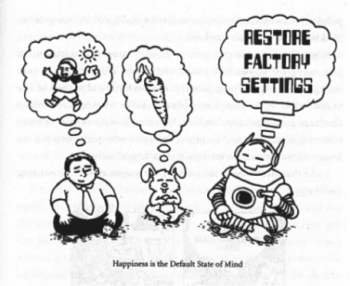 I had never heard of Chade-Meng Tan until I received an advance copy of his new book, “Search Inside Yourself: The Unexpected Path to Achieving Success, Happiness (and World Peace)” But once I read his book, I felt like I had connected with an old friend.
I had never heard of Chade-Meng Tan until I received an advance copy of his new book, “Search Inside Yourself: The Unexpected Path to Achieving Success, Happiness (and World Peace)” But once I read his book, I felt like I had connected with an old friend.
I immediately felt a kinship with Meng (as he is called by his friends—I’m taking liberties because I haven’t actually met him) thanks to all the things we have in common:
- Both of us work in large corporations in the Fortune 500.
- Both of us are trying to shift the culture of our companies using principles of mindfulness and positive psychology.
- Both of us are extending way beyond our traditional job description in order to this.
- And both of us are driven to do this by a far deeper desire to create more peace and happiness in the world.
I assume that Meng was able to pursue his mission of creating more world peace by taking advantage of Google’s policy of allowing people to spend 20% of their time working on whatever they want to work on. Meng wanted to work on world peace, and felt he could make an impact by combining his personal study of mindfulness with Daniel Goleman’s research on emotional intelligence, eventually creating a popular course for Google associates called “Search Inside Yourself.”
What Meng does well (far better than I, in fact) is communicate complex and ethereal ideas such as mindfulness, compassion, loving kindness, and emotional intelligence in a way that is highly accessible and easy to understand in the corporate, high-tech world of Google.
Since Meng started out as an engineer himself, he speaks the language and is able to translate these lofty concepts to an audience that needs to understand the science behind it before they can embrace it. As Meng says in this wonderful inteview, “for those people who call this hippie bullshit . . . at least they are curious enough to ask, why is Meng teaching this crap?” He takes his openings where he can.
Today, Meng’s job title (as listed on his business card) is “Jolly Good Fellow (which nobody can deny)” and his job description is “enlighten minds, open hearts, create world peace.” A nice gig if you can get it.
Although it would be easy to accuse Meng of overstating his case (“c’mon, how’s a corporate training program at Google going to create world peace?”) I actually think he lives up to his job description. His book serves as a nifty guide that can introduce mindfulness and compassion to a large audience. Even the most skeptical newbies to this stuff will find Meng’s approach engaging and compelling. And experienced meditators and teachers of these ideas will learn from Meng’s accessible teaching style.
Here are just a few of the tips that Meng teaches to get his Googlers in a more mindful state:
1. Happiness is the default state of mind. If we can clear the mind, happiness is there. “Happiness is not something that you pursue; it is something you allow.” If that doesn’t sink in for the engineers in the room, Meng talks about “restoring factory settings.”
2. Meditation is like exercise. When we go to the gym, we don’t consider ourselves a failure if we can’t lift a weight. We recognize that we are stretching our capabilities and that this will make us stronger. “There is no such thing as a bad meditation,” says Meng, “Meditation is like sweating at the gym, minus the sweating, and the gym.”
3. Compassionate leadership is the most effective leadership. Meng makes a direct link between compassion and what Jim Collins described as “Level 5 Leadership” in his iconic leadership book, “Good to Great.” The best leaders are humbly tuned in to others and motivated to drive towards the greater good for all.
These tips are only scratching the surface. Meng’s book goes far deeper and I highly recommend it to anyone. I’m not sure if Meng will achieve his goal of world peace in his lifetime, but I can’t help thinking that the world is a better place for having Meng and his book in it.
—
References and recommended reading:
Tan, C. (2012). Search Inside Yourself: The Unexpected Path to Achieving Success, Happiness (and World Peace). HarperOne.
The book is filled with wonderful illustrations by Colin Goh. I posted two of them above (with permission.)
By Jeremy McCarthy. Connect with me on facebook, twitter, or pinterest.



Thanks for the book recommendation – it couldn’t have come at a better time for me. I finally decided to make a seriouse attempt at making meditation a habit. I’ll report back on how it goes.
I’m so glad you found a kindred spirit in Meng!
Thanks for being a part of the tour. I’m featuring your review on TLC’s Facebook page today.
I never thought of happiness being our default state of mind, but after thinking about it, I see how that’s true (at least for me).
I hope you’ll give periodic updates on your efforts to shift the culture of your company! That is fascinating and really inspiring.
Thanks Trish!
I stumbled a bit myself on that part about happiness being the default state of mind because I think it’s somewhat misleading. It could make people feel like happiness should be easy or that if someone is unhappy they must have done something wrong. The reason he says happiness is the default state of mind is because “if your mind is calm and clear” you will be happy. How often are our minds calm and clear? That definitely is not the “default.” I tend to think the “default” is more like the way babies come into the world . . . .bawling their eyes out. 🙂